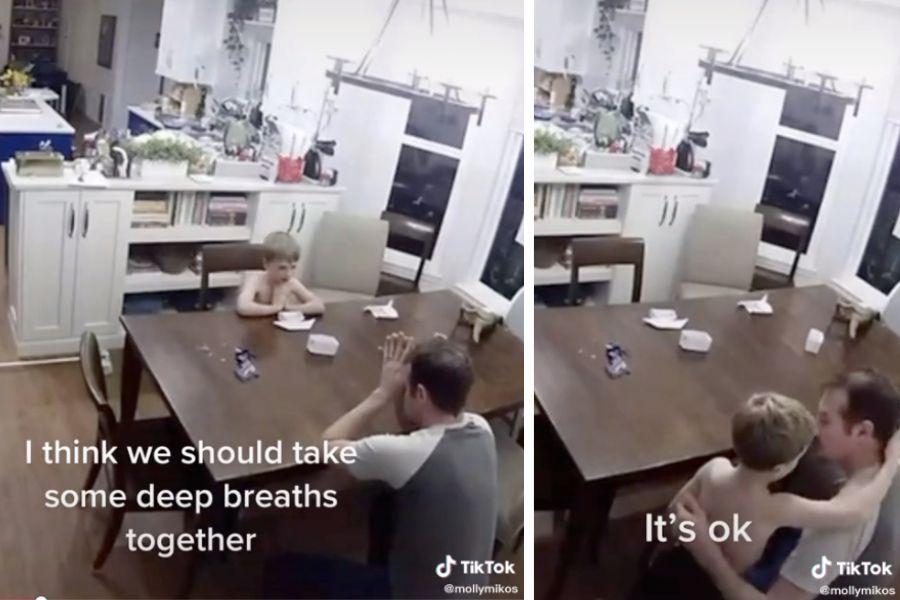Anyone who has parented a spirited “threenager” knows how hard handling toddler tantrums can be. Parents often joke about our wee ones throwing down, because laughter is sometimes the only way to cope. But in reality, it can be extremely disturbing and distressing for the entire household when a family member carries on in a way that feels—or truly is—out of control.
Major tantrums can be especially hard for parents who didn’t have good parenting examples themselves. It takes superhuman patience to be the parents we want to be some days, and none of us does it perfectly all the time. When a child is screaming and crying over something irrational and nothing seems to be working to get them to stop, exhausted parents can lose their cool and respond in ways they normally wouldn’t.
That’s one reason a TikTok video of a father and son captured in the aftermath of an epic toddler tantrum has caught people’s attention. Many of us have been in the dad’s shoes before, frazzled and shaken by the relentlessness and intensity of a 3-year-old’s meltdown. And many of us have been in the son’s shoes as well, witnessing a younger sibling’s insanity and our parents’ struggle to manage the situation.
But the way this father and son support one another is bringing people to tears with its beautiful example of emotional regulation, empathy and connection.
TikTok user @mollymikos shared the video, explaining that their 3-year-old had just thrown a 2 1/2-hour tantrum (which she clarified was actually two tantrums with a 10-minute break in between). “We did not have Unicorn Chopsticks and would not go to the store (where they don’t sell unicorn chopsticks….),” she explained when someone asked what the fit was over. Sounds about right. The tyrannical threes are no joke.
So much to love in this video. First, the 6-year-old, whom Mikos describes as “empathetic” and “a deeply feeling kid,” demonstrated impressive self-regulation skills. The way he started taking deep breaths and suggested that he and Dad do some deep breathing together was inspiring. Second, the dad apologized for losing it and explained that they were trying to set a better example as parents, which many parents are far too proud to do. Finally, the kiddo displayed such deep understanding and compassion, it was clear these parents have worked hard to create healthy emotional connections and open communication in their family.
Mikos tells Upworthy that she and her husband have been working hard to break the stress cycles that so often get passed down from generation to generation.
“I didn’t realize how much would be brought up by having children,” she says. “We are working on repairing and changing the way we interact with our children so that they feel supported instead of shamed.”
Mikos says social media has given this generation of parents access to experts, studies and revelations that can help them navigate raising kids with gentle parenting principles. She personally finds inspiration on Instagram from Dr. Becky Kennedy, Janet Lansbury, Conscious Mommy and Eli Harwood. “They’ve changed my life,” she says.
People are loving the example Mikos and her husband are setting with—and for—their kids.
“This just goes to show how much of a great job your doing!!!” wrote one commenter. “Toddlers are hard and the fact your 6yo was able to empathize and communicate shows it.”
“This is why you’re good parents,” shared another. “Your older child can regulate his emotions and is empathetic. That’s amazing at any age and you did that.”
“Not me sobbing at 2 am bc this is the healthiest parent-child relationship ever,” wrote another. “Keep it up ??? yall are doing awesome.”
Mikos has been heartened by all the comments on her video. The fact that her husband apologized to their son for losing his patience was particularly moving for a lot of commenters, especially those who had parents who never did that. “Many people have said that they didn’t realize parents could apologize to their children,” she says. “Yes. Please apologize. They need to know we make mistakes, and that we still love them and are constantly trying to do better.”
Apologizing to our kids when we’re in the wrong or when we behave in a way we’re not proud of demonstrates respect and teaches accountability by example. The fact that this dad is comfortable apologizing is likely a big reason why his son has the emotional tools that he does.
Gentle, compassionate parenting may not instantaneously end a tantrum, but it does pay off with big emotional and relational wins in the long run.
This article originally appeared on 11.12.22





























